Emerging Trends in the Hospitality Industry: Leadership Styles, Organizational Responsibility, CSR, and Social Media Risks
VerifiedAdded on 2023/06/11
|15
|5052
|127
AI Summary
This report explores the emerging trends in the hospitality industry, including the evaluation of appropriate leadership styles, organizational responsibility, responsible leadership, and corporate social responsibility. It also critically analyzes the benefits of social media and its related risks. The report is based on Hilton, a global brand of full-service hotels and resorts under the flagship of an American multinational hospitality company.
Contribute Materials
Your contribution can guide someone’s learning journey. Share your
documents today.
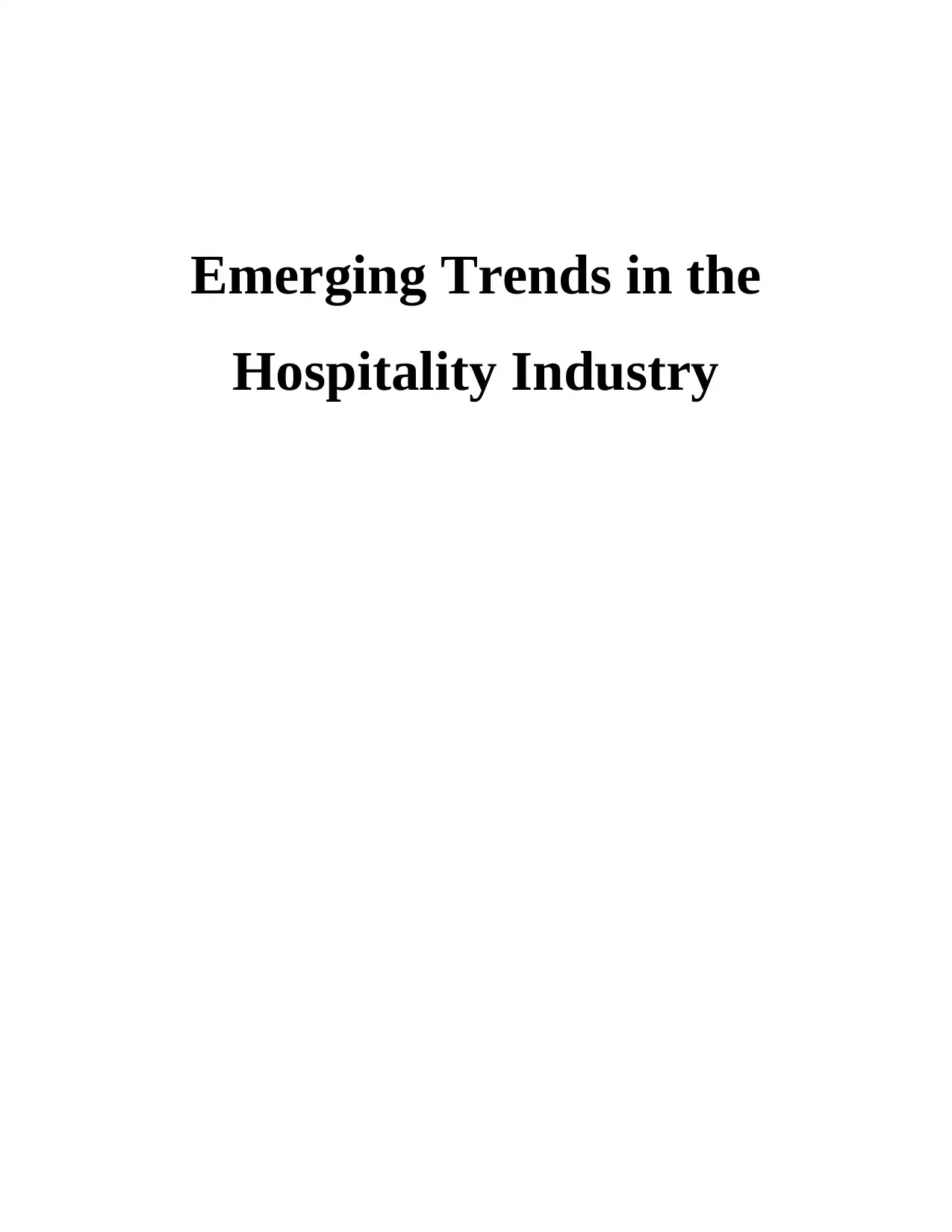
Emerging Trends in the
Hospitality Industry
Hospitality Industry
Secure Best Marks with AI Grader
Need help grading? Try our AI Grader for instant feedback on your assignments.
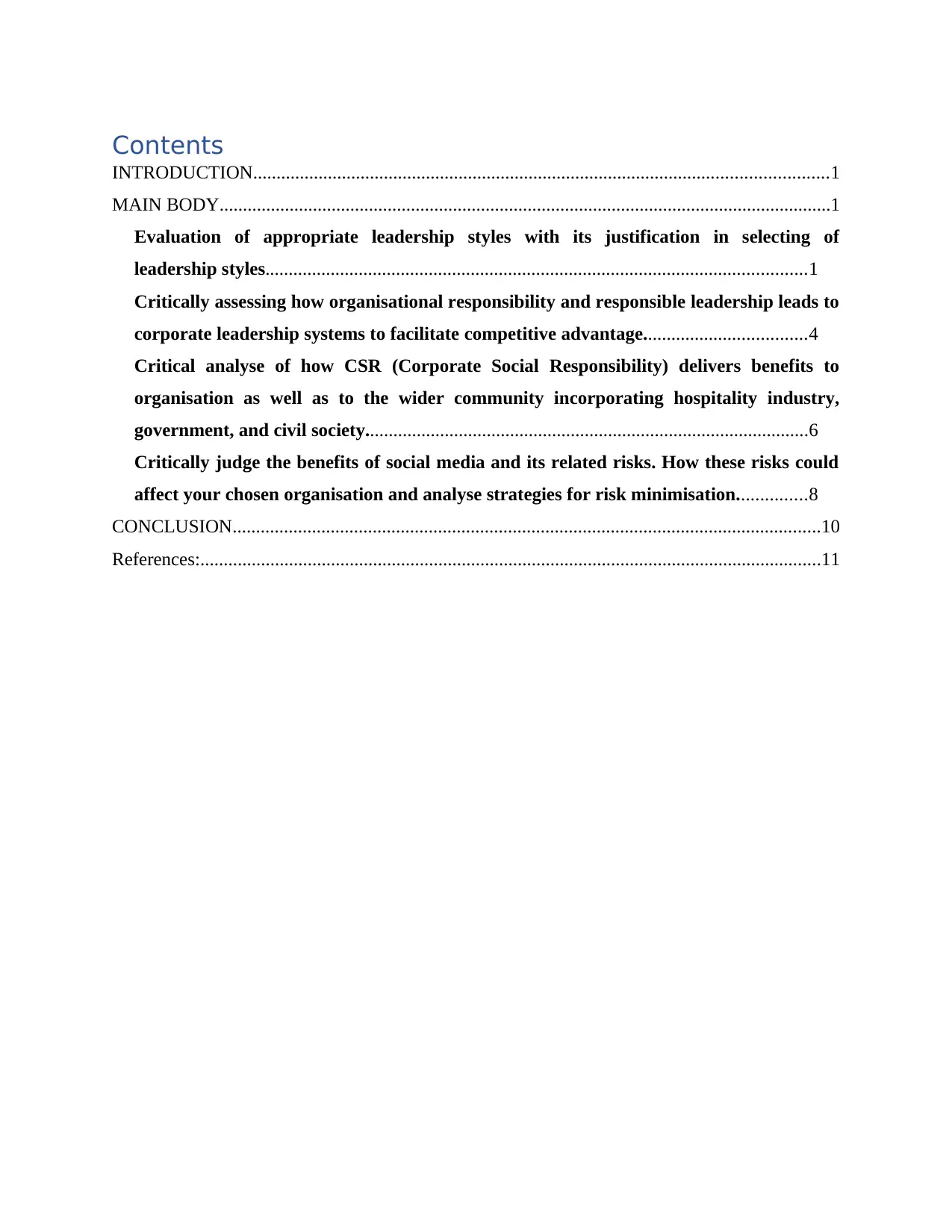
Contents
INTRODUCTION...........................................................................................................................1
MAIN BODY...................................................................................................................................1
Evaluation of appropriate leadership styles with its justification in selecting of
leadership styles....................................................................................................................1
Critically assessing how organisational responsibility and responsible leadership leads to
corporate leadership systems to facilitate competitive advantage...................................4
Critical analyse of how CSR (Corporate Social Responsibility) delivers benefits to
organisation as well as to the wider community incorporating hospitality industry,
government, and civil society...............................................................................................6
Critically judge the benefits of social media and its related risks. How these risks could
affect your chosen organisation and analyse strategies for risk minimisation...............8
CONCLUSION..............................................................................................................................10
References:.....................................................................................................................................11
INTRODUCTION...........................................................................................................................1
MAIN BODY...................................................................................................................................1
Evaluation of appropriate leadership styles with its justification in selecting of
leadership styles....................................................................................................................1
Critically assessing how organisational responsibility and responsible leadership leads to
corporate leadership systems to facilitate competitive advantage...................................4
Critical analyse of how CSR (Corporate Social Responsibility) delivers benefits to
organisation as well as to the wider community incorporating hospitality industry,
government, and civil society...............................................................................................6
Critically judge the benefits of social media and its related risks. How these risks could
affect your chosen organisation and analyse strategies for risk minimisation...............8
CONCLUSION..............................................................................................................................10
References:.....................................................................................................................................11
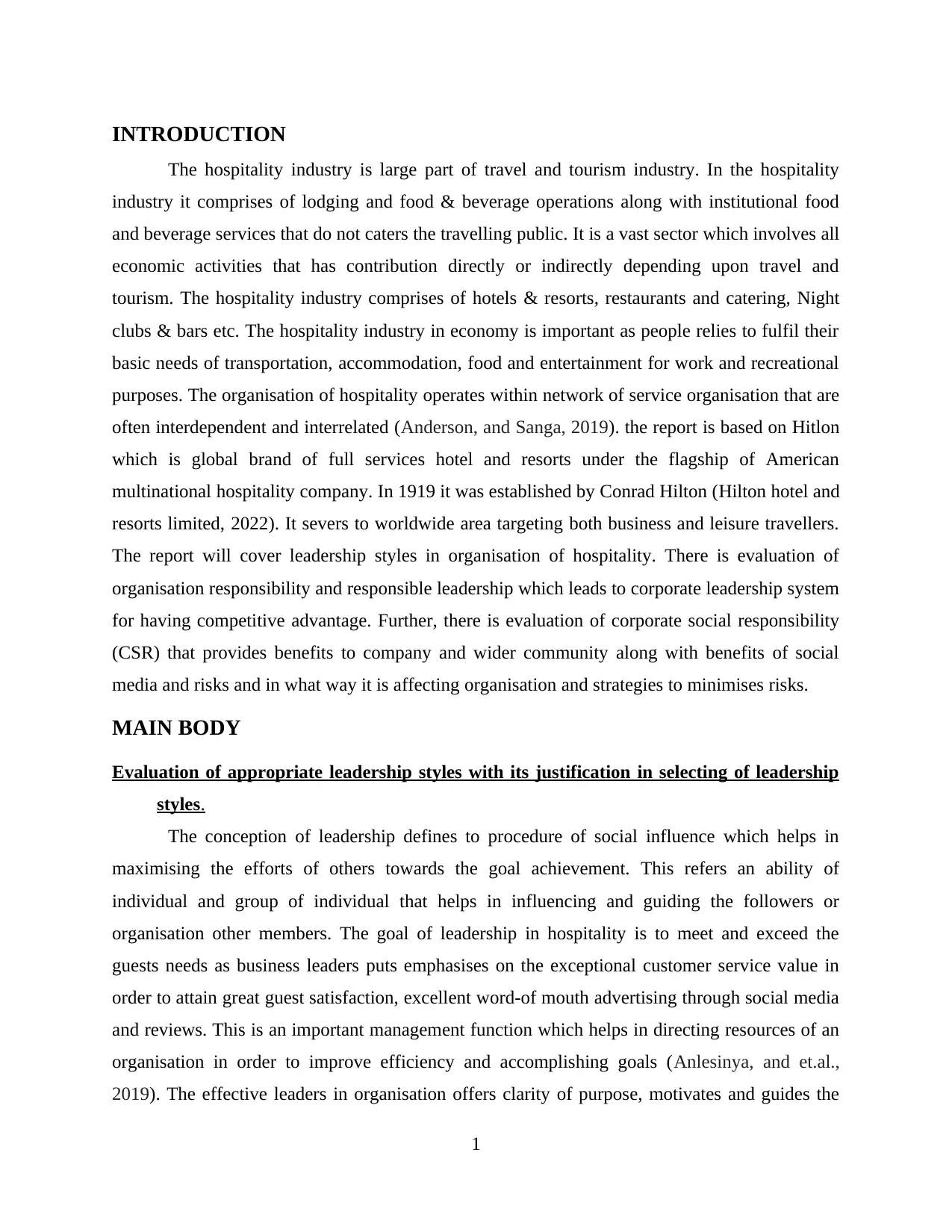
INTRODUCTION
The hospitality industry is large part of travel and tourism industry. In the hospitality
industry it comprises of lodging and food & beverage operations along with institutional food
and beverage services that do not caters the travelling public. It is a vast sector which involves all
economic activities that has contribution directly or indirectly depending upon travel and
tourism. The hospitality industry comprises of hotels & resorts, restaurants and catering, Night
clubs & bars etc. The hospitality industry in economy is important as people relies to fulfil their
basic needs of transportation, accommodation, food and entertainment for work and recreational
purposes. The organisation of hospitality operates within network of service organisation that are
often interdependent and interrelated (Anderson, and Sanga, 2019). the report is based on Hitlon
which is global brand of full services hotel and resorts under the flagship of American
multinational hospitality company. In 1919 it was established by Conrad Hilton (Hilton hotel and
resorts limited, 2022). It severs to worldwide area targeting both business and leisure travellers.
The report will cover leadership styles in organisation of hospitality. There is evaluation of
organisation responsibility and responsible leadership which leads to corporate leadership system
for having competitive advantage. Further, there is evaluation of corporate social responsibility
(CSR) that provides benefits to company and wider community along with benefits of social
media and risks and in what way it is affecting organisation and strategies to minimises risks.
MAIN BODY
Evaluation of appropriate leadership styles with its justification in selecting of leadership
styles.
The conception of leadership defines to procedure of social influence which helps in
maximising the efforts of others towards the goal achievement. This refers an ability of
individual and group of individual that helps in influencing and guiding the followers or
organisation other members. The goal of leadership in hospitality is to meet and exceed the
guests needs as business leaders puts emphasises on the exceptional customer service value in
order to attain great guest satisfaction, excellent word-of mouth advertising through social media
and reviews. This is an important management function which helps in directing resources of an
organisation in order to improve efficiency and accomplishing goals (Anlesinya, and et.al.,
2019). The effective leaders in organisation offers clarity of purpose, motivates and guides the
1
The hospitality industry is large part of travel and tourism industry. In the hospitality
industry it comprises of lodging and food & beverage operations along with institutional food
and beverage services that do not caters the travelling public. It is a vast sector which involves all
economic activities that has contribution directly or indirectly depending upon travel and
tourism. The hospitality industry comprises of hotels & resorts, restaurants and catering, Night
clubs & bars etc. The hospitality industry in economy is important as people relies to fulfil their
basic needs of transportation, accommodation, food and entertainment for work and recreational
purposes. The organisation of hospitality operates within network of service organisation that are
often interdependent and interrelated (Anderson, and Sanga, 2019). the report is based on Hitlon
which is global brand of full services hotel and resorts under the flagship of American
multinational hospitality company. In 1919 it was established by Conrad Hilton (Hilton hotel and
resorts limited, 2022). It severs to worldwide area targeting both business and leisure travellers.
The report will cover leadership styles in organisation of hospitality. There is evaluation of
organisation responsibility and responsible leadership which leads to corporate leadership system
for having competitive advantage. Further, there is evaluation of corporate social responsibility
(CSR) that provides benefits to company and wider community along with benefits of social
media and risks and in what way it is affecting organisation and strategies to minimises risks.
MAIN BODY
Evaluation of appropriate leadership styles with its justification in selecting of leadership
styles.
The conception of leadership defines to procedure of social influence which helps in
maximising the efforts of others towards the goal achievement. This refers an ability of
individual and group of individual that helps in influencing and guiding the followers or
organisation other members. The goal of leadership in hospitality is to meet and exceed the
guests needs as business leaders puts emphasises on the exceptional customer service value in
order to attain great guest satisfaction, excellent word-of mouth advertising through social media
and reviews. This is an important management function which helps in directing resources of an
organisation in order to improve efficiency and accomplishing goals (Anlesinya, and et.al.,
2019). The effective leaders in organisation offers clarity of purpose, motivates and guides the
1
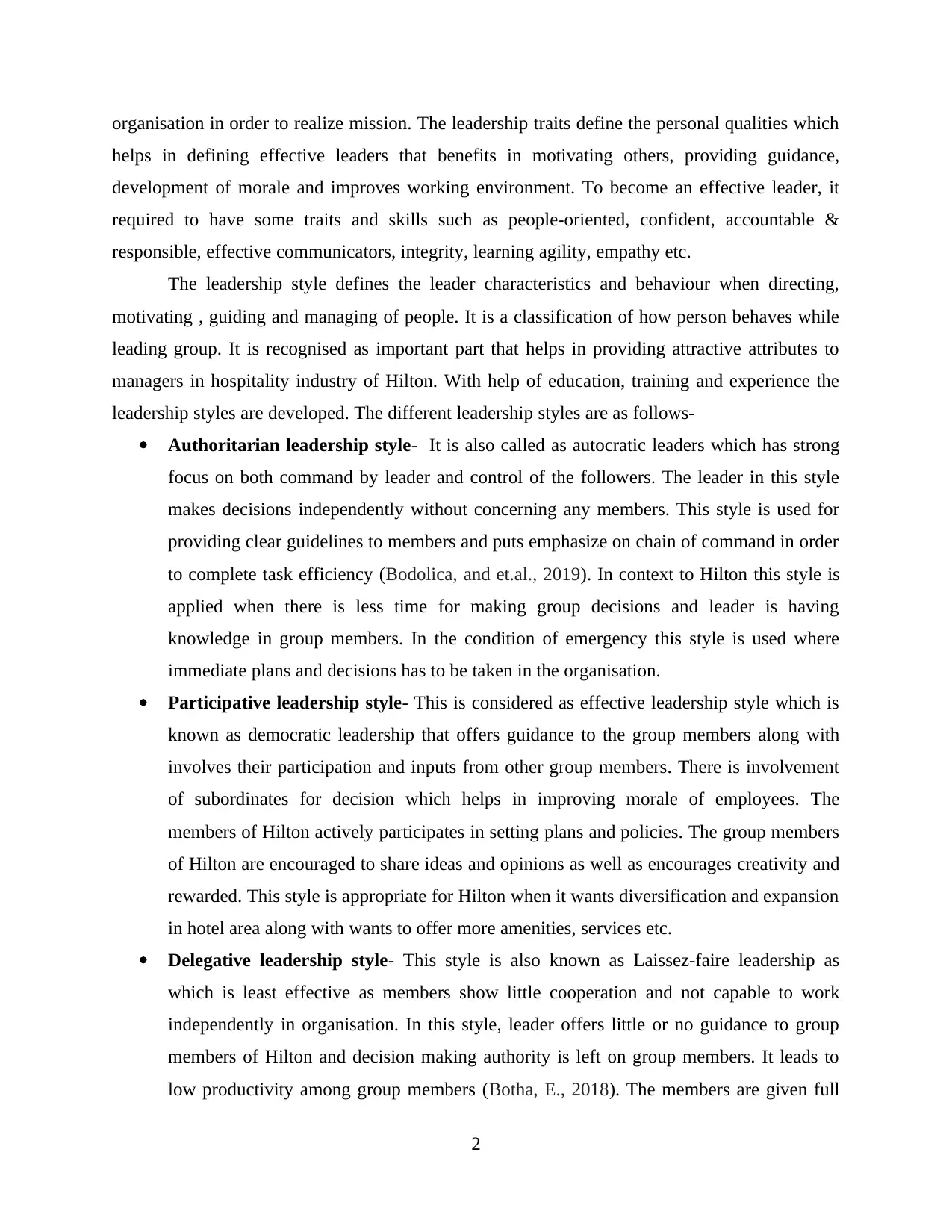
organisation in order to realize mission. The leadership traits define the personal qualities which
helps in defining effective leaders that benefits in motivating others, providing guidance,
development of morale and improves working environment. To become an effective leader, it
required to have some traits and skills such as people-oriented, confident, accountable &
responsible, effective communicators, integrity, learning agility, empathy etc.
The leadership style defines the leader characteristics and behaviour when directing,
motivating , guiding and managing of people. It is a classification of how person behaves while
leading group. It is recognised as important part that helps in providing attractive attributes to
managers in hospitality industry of Hilton. With help of education, training and experience the
leadership styles are developed. The different leadership styles are as follows-
Authoritarian leadership style- It is also called as autocratic leaders which has strong
focus on both command by leader and control of the followers. The leader in this style
makes decisions independently without concerning any members. This style is used for
providing clear guidelines to members and puts emphasize on chain of command in order
to complete task efficiency (Bodolica, and et.al., 2019). In context to Hilton this style is
applied when there is less time for making group decisions and leader is having
knowledge in group members. In the condition of emergency this style is used where
immediate plans and decisions has to be taken in the organisation.
Participative leadership style- This is considered as effective leadership style which is
known as democratic leadership that offers guidance to the group members along with
involves their participation and inputs from other group members. There is involvement
of subordinates for decision which helps in improving morale of employees. The
members of Hilton actively participates in setting plans and policies. The group members
of Hilton are encouraged to share ideas and opinions as well as encourages creativity and
rewarded. This style is appropriate for Hilton when it wants diversification and expansion
in hotel area along with wants to offer more amenities, services etc.
Delegative leadership style- This style is also known as Laissez-faire leadership as
which is least effective as members show little cooperation and not capable to work
independently in organisation. In this style, leader offers little or no guidance to group
members of Hilton and decision making authority is left on group members. It leads to
low productivity among group members (Botha, E., 2018). The members are given full
2
helps in defining effective leaders that benefits in motivating others, providing guidance,
development of morale and improves working environment. To become an effective leader, it
required to have some traits and skills such as people-oriented, confident, accountable &
responsible, effective communicators, integrity, learning agility, empathy etc.
The leadership style defines the leader characteristics and behaviour when directing,
motivating , guiding and managing of people. It is a classification of how person behaves while
leading group. It is recognised as important part that helps in providing attractive attributes to
managers in hospitality industry of Hilton. With help of education, training and experience the
leadership styles are developed. The different leadership styles are as follows-
Authoritarian leadership style- It is also called as autocratic leaders which has strong
focus on both command by leader and control of the followers. The leader in this style
makes decisions independently without concerning any members. This style is used for
providing clear guidelines to members and puts emphasize on chain of command in order
to complete task efficiency (Bodolica, and et.al., 2019). In context to Hilton this style is
applied when there is less time for making group decisions and leader is having
knowledge in group members. In the condition of emergency this style is used where
immediate plans and decisions has to be taken in the organisation.
Participative leadership style- This is considered as effective leadership style which is
known as democratic leadership that offers guidance to the group members along with
involves their participation and inputs from other group members. There is involvement
of subordinates for decision which helps in improving morale of employees. The
members of Hilton actively participates in setting plans and policies. The group members
of Hilton are encouraged to share ideas and opinions as well as encourages creativity and
rewarded. This style is appropriate for Hilton when it wants diversification and expansion
in hotel area along with wants to offer more amenities, services etc.
Delegative leadership style- This style is also known as Laissez-faire leadership as
which is least effective as members show little cooperation and not capable to work
independently in organisation. In this style, leader offers little or no guidance to group
members of Hilton and decision making authority is left on group members. It leads to
low productivity among group members (Botha, E., 2018). The members are given full
2
Secure Best Marks with AI Grader
Need help grading? Try our AI Grader for instant feedback on your assignments.
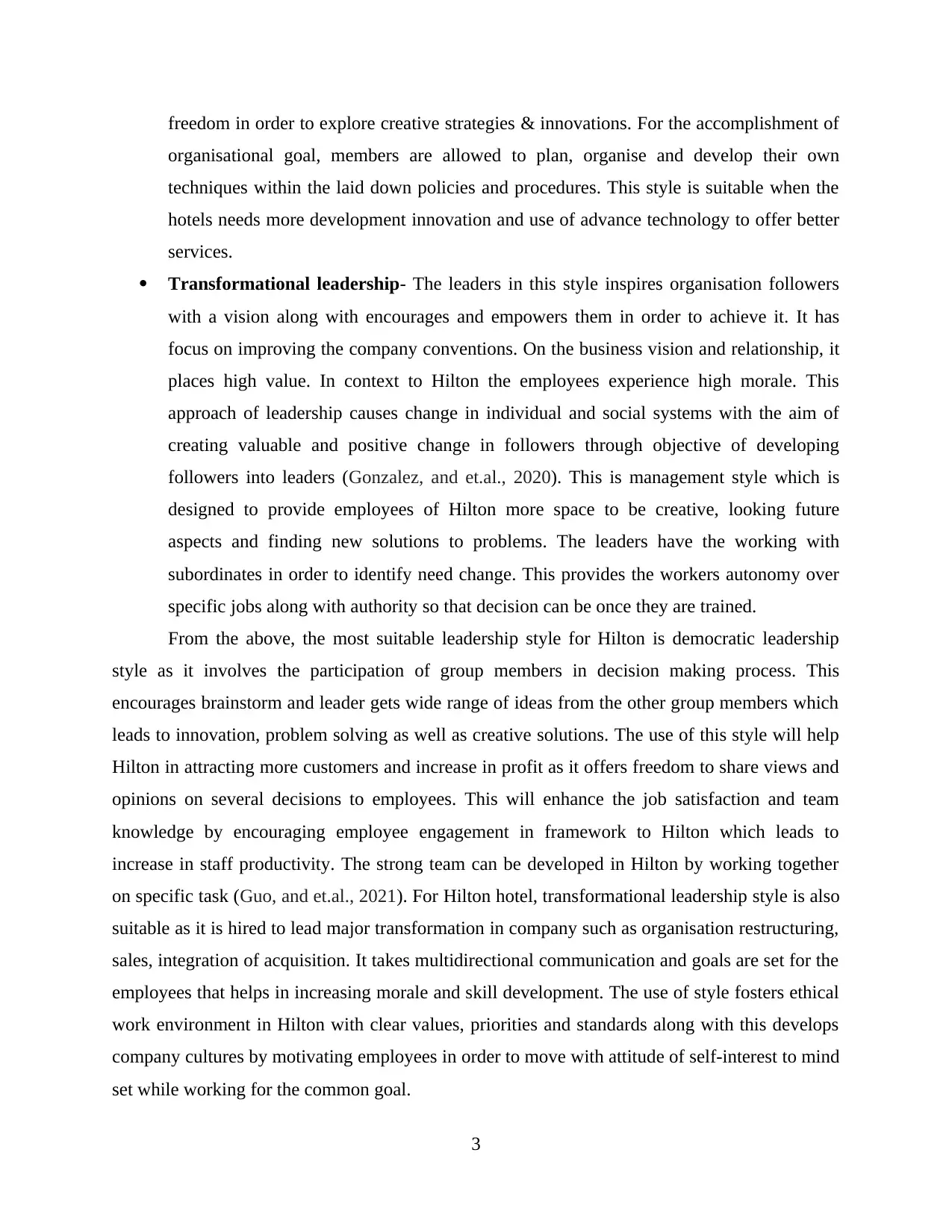
freedom in order to explore creative strategies & innovations. For the accomplishment of
organisational goal, members are allowed to plan, organise and develop their own
techniques within the laid down policies and procedures. This style is suitable when the
hotels needs more development innovation and use of advance technology to offer better
services.
Transformational leadership- The leaders in this style inspires organisation followers
with a vision along with encourages and empowers them in order to achieve it. It has
focus on improving the company conventions. On the business vision and relationship, it
places high value. In context to Hilton the employees experience high morale. This
approach of leadership causes change in individual and social systems with the aim of
creating valuable and positive change in followers through objective of developing
followers into leaders (Gonzalez, and et.al., 2020). This is management style which is
designed to provide employees of Hilton more space to be creative, looking future
aspects and finding new solutions to problems. The leaders have the working with
subordinates in order to identify need change. This provides the workers autonomy over
specific jobs along with authority so that decision can be once they are trained.
From the above, the most suitable leadership style for Hilton is democratic leadership
style as it involves the participation of group members in decision making process. This
encourages brainstorm and leader gets wide range of ideas from the other group members which
leads to innovation, problem solving as well as creative solutions. The use of this style will help
Hilton in attracting more customers and increase in profit as it offers freedom to share views and
opinions on several decisions to employees. This will enhance the job satisfaction and team
knowledge by encouraging employee engagement in framework to Hilton which leads to
increase in staff productivity. The strong team can be developed in Hilton by working together
on specific task (Guo, and et.al., 2021). For Hilton hotel, transformational leadership style is also
suitable as it is hired to lead major transformation in company such as organisation restructuring,
sales, integration of acquisition. It takes multidirectional communication and goals are set for the
employees that helps in increasing morale and skill development. The use of style fosters ethical
work environment in Hilton with clear values, priorities and standards along with this develops
company cultures by motivating employees in order to move with attitude of self-interest to mind
set while working for the common goal.
3
organisational goal, members are allowed to plan, organise and develop their own
techniques within the laid down policies and procedures. This style is suitable when the
hotels needs more development innovation and use of advance technology to offer better
services.
Transformational leadership- The leaders in this style inspires organisation followers
with a vision along with encourages and empowers them in order to achieve it. It has
focus on improving the company conventions. On the business vision and relationship, it
places high value. In context to Hilton the employees experience high morale. This
approach of leadership causes change in individual and social systems with the aim of
creating valuable and positive change in followers through objective of developing
followers into leaders (Gonzalez, and et.al., 2020). This is management style which is
designed to provide employees of Hilton more space to be creative, looking future
aspects and finding new solutions to problems. The leaders have the working with
subordinates in order to identify need change. This provides the workers autonomy over
specific jobs along with authority so that decision can be once they are trained.
From the above, the most suitable leadership style for Hilton is democratic leadership
style as it involves the participation of group members in decision making process. This
encourages brainstorm and leader gets wide range of ideas from the other group members which
leads to innovation, problem solving as well as creative solutions. The use of this style will help
Hilton in attracting more customers and increase in profit as it offers freedom to share views and
opinions on several decisions to employees. This will enhance the job satisfaction and team
knowledge by encouraging employee engagement in framework to Hilton which leads to
increase in staff productivity. The strong team can be developed in Hilton by working together
on specific task (Guo, and et.al., 2021). For Hilton hotel, transformational leadership style is also
suitable as it is hired to lead major transformation in company such as organisation restructuring,
sales, integration of acquisition. It takes multidirectional communication and goals are set for the
employees that helps in increasing morale and skill development. The use of style fosters ethical
work environment in Hilton with clear values, priorities and standards along with this develops
company cultures by motivating employees in order to move with attitude of self-interest to mind
set while working for the common goal.
3
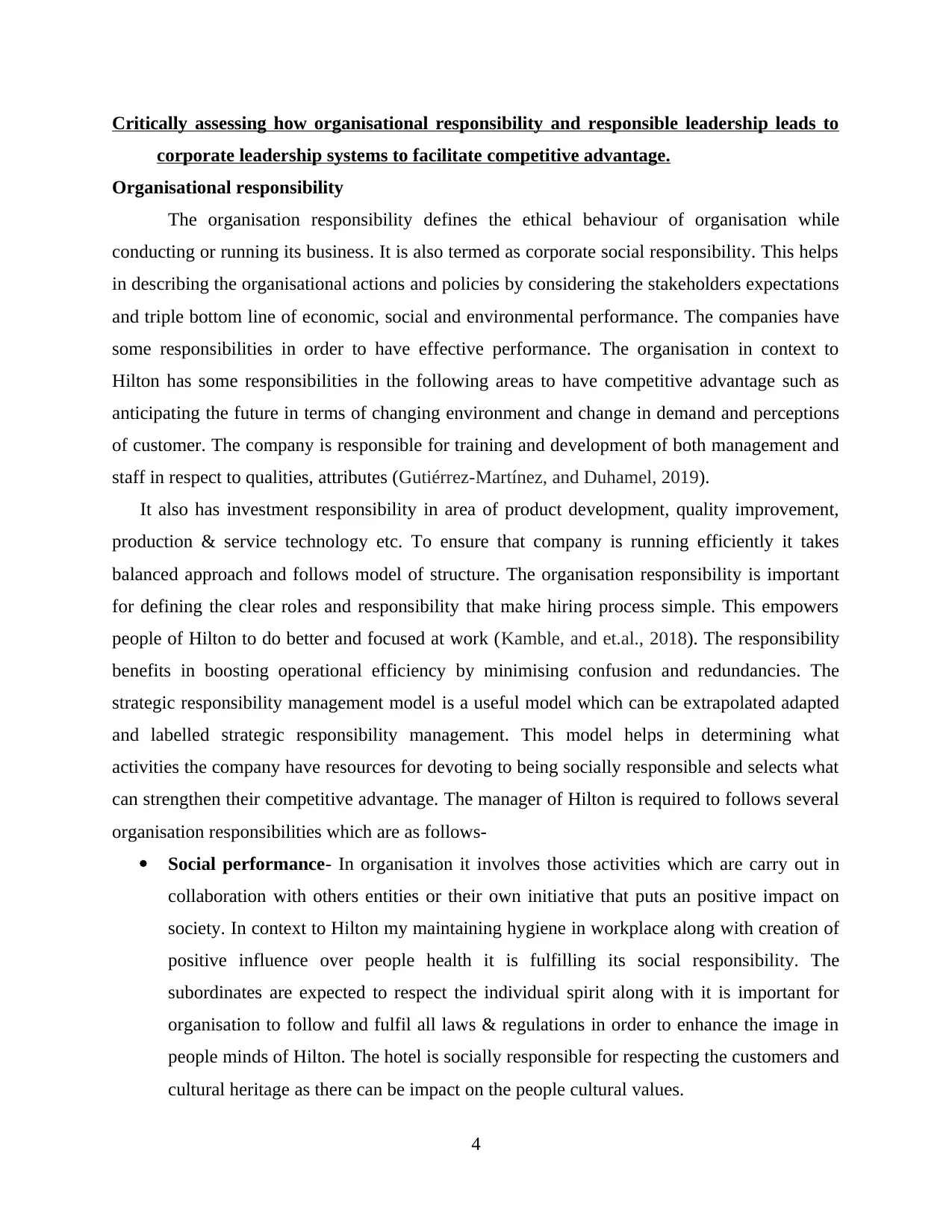
Critically assessing how organisational responsibility and responsible leadership leads to
corporate leadership systems to facilitate competitive advantage.
Organisational responsibility
The organisation responsibility defines the ethical behaviour of organisation while
conducting or running its business. It is also termed as corporate social responsibility. This helps
in describing the organisational actions and policies by considering the stakeholders expectations
and triple bottom line of economic, social and environmental performance. The companies have
some responsibilities in order to have effective performance. The organisation in context to
Hilton has some responsibilities in the following areas to have competitive advantage such as
anticipating the future in terms of changing environment and change in demand and perceptions
of customer. The company is responsible for training and development of both management and
staff in respect to qualities, attributes (Gutiérrez-Martínez, and Duhamel, 2019).
It also has investment responsibility in area of product development, quality improvement,
production & service technology etc. To ensure that company is running efficiently it takes
balanced approach and follows model of structure. The organisation responsibility is important
for defining the clear roles and responsibility that make hiring process simple. This empowers
people of Hilton to do better and focused at work (Kamble, and et.al., 2018). The responsibility
benefits in boosting operational efficiency by minimising confusion and redundancies. The
strategic responsibility management model is a useful model which can be extrapolated adapted
and labelled strategic responsibility management. This model helps in determining what
activities the company have resources for devoting to being socially responsible and selects what
can strengthen their competitive advantage. The manager of Hilton is required to follows several
organisation responsibilities which are as follows-
Social performance- In organisation it involves those activities which are carry out in
collaboration with others entities or their own initiative that puts an positive impact on
society. In context to Hilton my maintaining hygiene in workplace along with creation of
positive influence over people health it is fulfilling its social responsibility. The
subordinates are expected to respect the individual spirit along with it is important for
organisation to follow and fulfil all laws & regulations in order to enhance the image in
people minds of Hilton. The hotel is socially responsible for respecting the customers and
cultural heritage as there can be impact on the people cultural values.
4
corporate leadership systems to facilitate competitive advantage.
Organisational responsibility
The organisation responsibility defines the ethical behaviour of organisation while
conducting or running its business. It is also termed as corporate social responsibility. This helps
in describing the organisational actions and policies by considering the stakeholders expectations
and triple bottom line of economic, social and environmental performance. The companies have
some responsibilities in order to have effective performance. The organisation in context to
Hilton has some responsibilities in the following areas to have competitive advantage such as
anticipating the future in terms of changing environment and change in demand and perceptions
of customer. The company is responsible for training and development of both management and
staff in respect to qualities, attributes (Gutiérrez-Martínez, and Duhamel, 2019).
It also has investment responsibility in area of product development, quality improvement,
production & service technology etc. To ensure that company is running efficiently it takes
balanced approach and follows model of structure. The organisation responsibility is important
for defining the clear roles and responsibility that make hiring process simple. This empowers
people of Hilton to do better and focused at work (Kamble, and et.al., 2018). The responsibility
benefits in boosting operational efficiency by minimising confusion and redundancies. The
strategic responsibility management model is a useful model which can be extrapolated adapted
and labelled strategic responsibility management. This model helps in determining what
activities the company have resources for devoting to being socially responsible and selects what
can strengthen their competitive advantage. The manager of Hilton is required to follows several
organisation responsibilities which are as follows-
Social performance- In organisation it involves those activities which are carry out in
collaboration with others entities or their own initiative that puts an positive impact on
society. In context to Hilton my maintaining hygiene in workplace along with creation of
positive influence over people health it is fulfilling its social responsibility. The
subordinates are expected to respect the individual spirit along with it is important for
organisation to follow and fulfil all laws & regulations in order to enhance the image in
people minds of Hilton. The hotel is socially responsible for respecting the customers and
cultural heritage as there can be impact on the people cultural values.
4
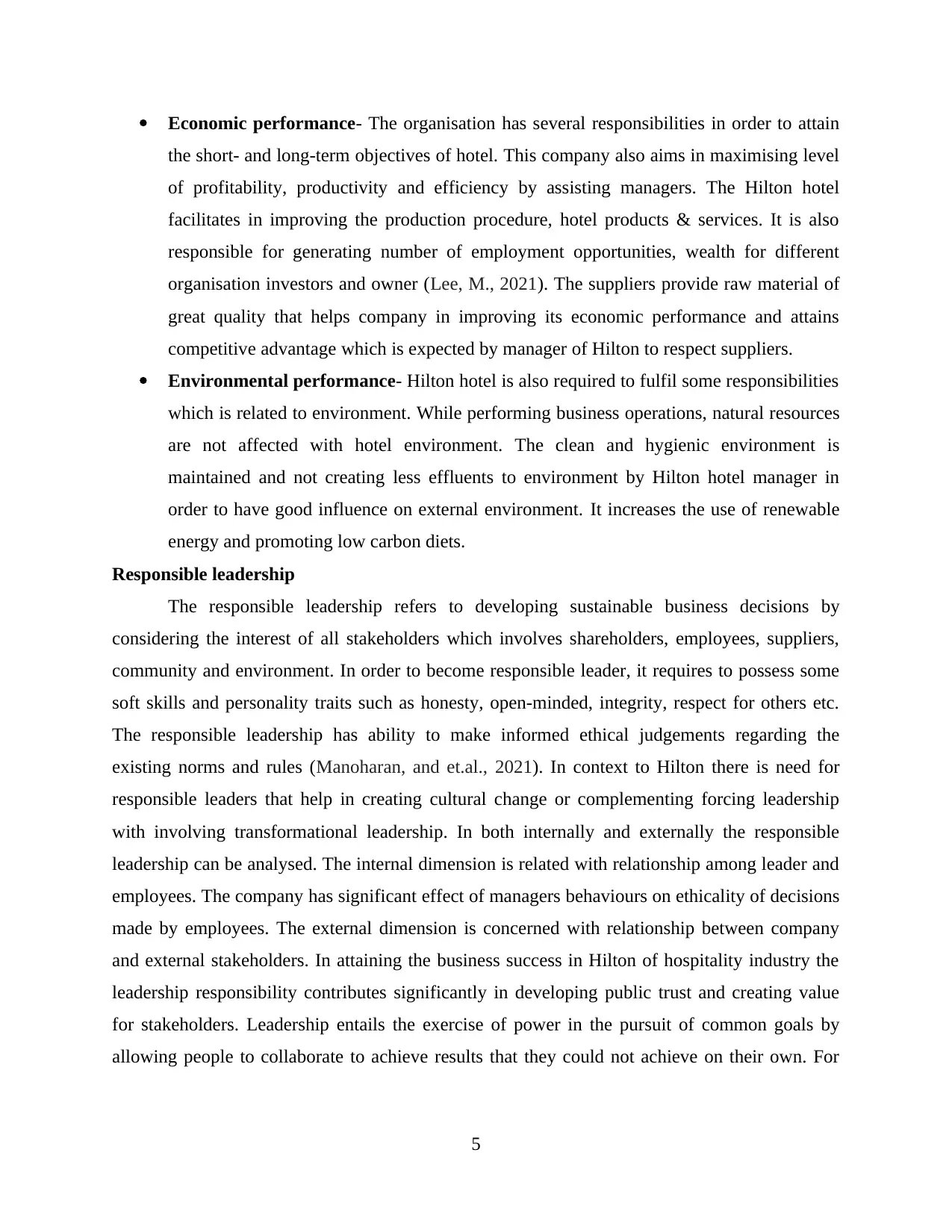
Economic performance- The organisation has several responsibilities in order to attain
the short- and long-term objectives of hotel. This company also aims in maximising level
of profitability, productivity and efficiency by assisting managers. The Hilton hotel
facilitates in improving the production procedure, hotel products & services. It is also
responsible for generating number of employment opportunities, wealth for different
organisation investors and owner (Lee, M., 2021). The suppliers provide raw material of
great quality that helps company in improving its economic performance and attains
competitive advantage which is expected by manager of Hilton to respect suppliers.
Environmental performance- Hilton hotel is also required to fulfil some responsibilities
which is related to environment. While performing business operations, natural resources
are not affected with hotel environment. The clean and hygienic environment is
maintained and not creating less effluents to environment by Hilton hotel manager in
order to have good influence on external environment. It increases the use of renewable
energy and promoting low carbon diets.
Responsible leadership
The responsible leadership refers to developing sustainable business decisions by
considering the interest of all stakeholders which involves shareholders, employees, suppliers,
community and environment. In order to become responsible leader, it requires to possess some
soft skills and personality traits such as honesty, open-minded, integrity, respect for others etc.
The responsible leadership has ability to make informed ethical judgements regarding the
existing norms and rules (Manoharan, and et.al., 2021). In context to Hilton there is need for
responsible leaders that help in creating cultural change or complementing forcing leadership
with involving transformational leadership. In both internally and externally the responsible
leadership can be analysed. The internal dimension is related with relationship among leader and
employees. The company has significant effect of managers behaviours on ethicality of decisions
made by employees. The external dimension is concerned with relationship between company
and external stakeholders. In attaining the business success in Hilton of hospitality industry the
leadership responsibility contributes significantly in developing public trust and creating value
for stakeholders. Leadership entails the exercise of power in the pursuit of common goals by
allowing people to collaborate to achieve results that they could not achieve on their own. For
5
the short- and long-term objectives of hotel. This company also aims in maximising level
of profitability, productivity and efficiency by assisting managers. The Hilton hotel
facilitates in improving the production procedure, hotel products & services. It is also
responsible for generating number of employment opportunities, wealth for different
organisation investors and owner (Lee, M., 2021). The suppliers provide raw material of
great quality that helps company in improving its economic performance and attains
competitive advantage which is expected by manager of Hilton to respect suppliers.
Environmental performance- Hilton hotel is also required to fulfil some responsibilities
which is related to environment. While performing business operations, natural resources
are not affected with hotel environment. The clean and hygienic environment is
maintained and not creating less effluents to environment by Hilton hotel manager in
order to have good influence on external environment. It increases the use of renewable
energy and promoting low carbon diets.
Responsible leadership
The responsible leadership refers to developing sustainable business decisions by
considering the interest of all stakeholders which involves shareholders, employees, suppliers,
community and environment. In order to become responsible leader, it requires to possess some
soft skills and personality traits such as honesty, open-minded, integrity, respect for others etc.
The responsible leadership has ability to make informed ethical judgements regarding the
existing norms and rules (Manoharan, and et.al., 2021). In context to Hilton there is need for
responsible leaders that help in creating cultural change or complementing forcing leadership
with involving transformational leadership. In both internally and externally the responsible
leadership can be analysed. The internal dimension is related with relationship among leader and
employees. The company has significant effect of managers behaviours on ethicality of decisions
made by employees. The external dimension is concerned with relationship between company
and external stakeholders. In attaining the business success in Hilton of hospitality industry the
leadership responsibility contributes significantly in developing public trust and creating value
for stakeholders. Leadership entails the exercise of power in the pursuit of common goals by
allowing people to collaborate to achieve results that they could not achieve on their own. For
5
Paraphrase This Document
Need a fresh take? Get an instant paraphrase of this document with our AI Paraphraser
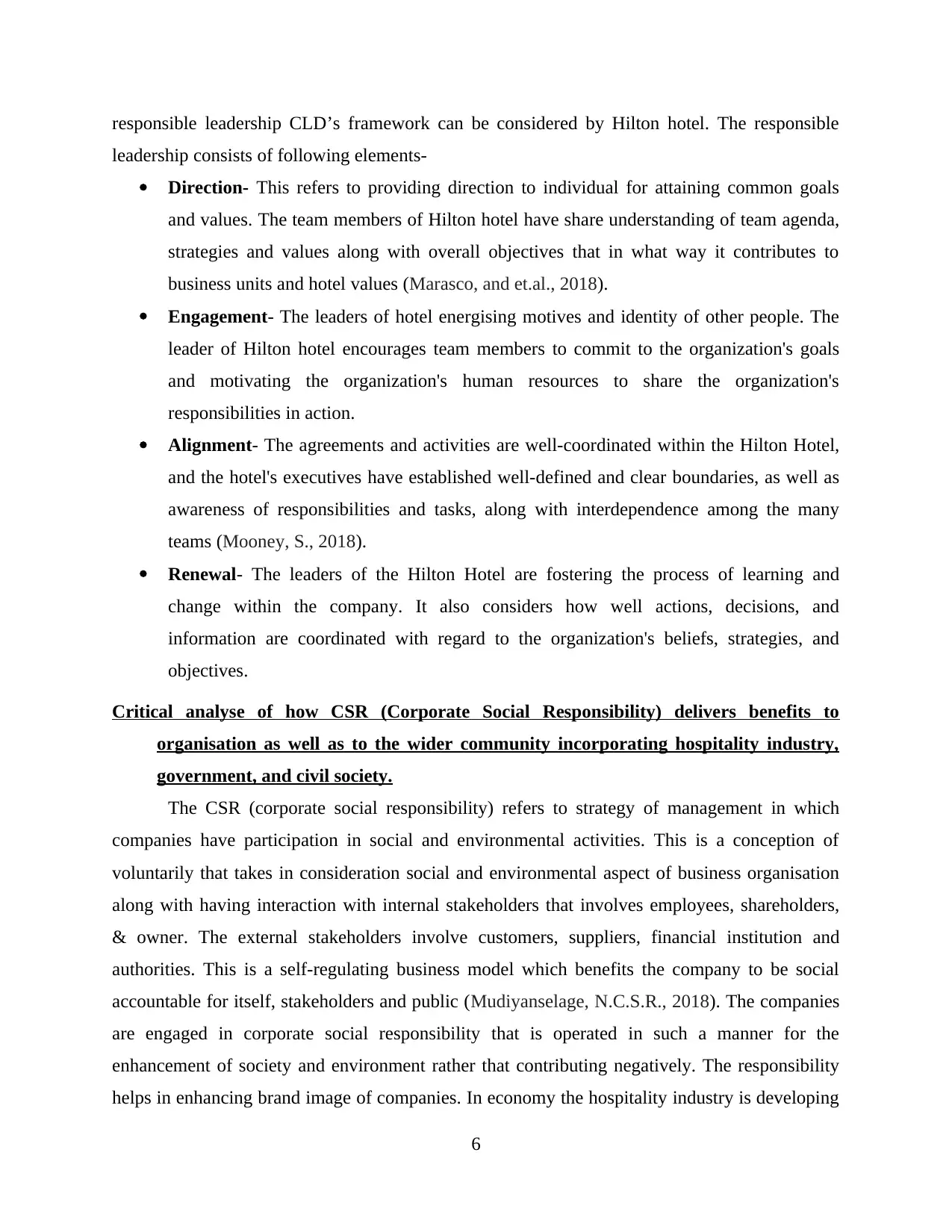
responsible leadership CLD’s framework can be considered by Hilton hotel. The responsible
leadership consists of following elements-
Direction- This refers to providing direction to individual for attaining common goals
and values. The team members of Hilton hotel have share understanding of team agenda,
strategies and values along with overall objectives that in what way it contributes to
business units and hotel values (Marasco, and et.al., 2018).
Engagement- The leaders of hotel energising motives and identity of other people. The
leader of Hilton hotel encourages team members to commit to the organization's goals
and motivating the organization's human resources to share the organization's
responsibilities in action.
Alignment- The agreements and activities are well-coordinated within the Hilton Hotel,
and the hotel's executives have established well-defined and clear boundaries, as well as
awareness of responsibilities and tasks, along with interdependence among the many
teams (Mooney, S., 2018).
Renewal- The leaders of the Hilton Hotel are fostering the process of learning and
change within the company. It also considers how well actions, decisions, and
information are coordinated with regard to the organization's beliefs, strategies, and
objectives.
Critical analyse of how CSR (Corporate Social Responsibility) delivers benefits to
organisation as well as to the wider community incorporating hospitality industry,
government, and civil society.
The CSR (corporate social responsibility) refers to strategy of management in which
companies have participation in social and environmental activities. This is a conception of
voluntarily that takes in consideration social and environmental aspect of business organisation
along with having interaction with internal stakeholders that involves employees, shareholders,
& owner. The external stakeholders involve customers, suppliers, financial institution and
authorities. This is a self-regulating business model which benefits the company to be social
accountable for itself, stakeholders and public (Mudiyanselage, N.C.S.R., 2018). The companies
are engaged in corporate social responsibility that is operated in such a manner for the
enhancement of society and environment rather that contributing negatively. The responsibility
helps in enhancing brand image of companies. In economy the hospitality industry is developing
6
leadership consists of following elements-
Direction- This refers to providing direction to individual for attaining common goals
and values. The team members of Hilton hotel have share understanding of team agenda,
strategies and values along with overall objectives that in what way it contributes to
business units and hotel values (Marasco, and et.al., 2018).
Engagement- The leaders of hotel energising motives and identity of other people. The
leader of Hilton hotel encourages team members to commit to the organization's goals
and motivating the organization's human resources to share the organization's
responsibilities in action.
Alignment- The agreements and activities are well-coordinated within the Hilton Hotel,
and the hotel's executives have established well-defined and clear boundaries, as well as
awareness of responsibilities and tasks, along with interdependence among the many
teams (Mooney, S., 2018).
Renewal- The leaders of the Hilton Hotel are fostering the process of learning and
change within the company. It also considers how well actions, decisions, and
information are coordinated with regard to the organization's beliefs, strategies, and
objectives.
Critical analyse of how CSR (Corporate Social Responsibility) delivers benefits to
organisation as well as to the wider community incorporating hospitality industry,
government, and civil society.
The CSR (corporate social responsibility) refers to strategy of management in which
companies have participation in social and environmental activities. This is a conception of
voluntarily that takes in consideration social and environmental aspect of business organisation
along with having interaction with internal stakeholders that involves employees, shareholders,
& owner. The external stakeholders involve customers, suppliers, financial institution and
authorities. This is a self-regulating business model which benefits the company to be social
accountable for itself, stakeholders and public (Mudiyanselage, N.C.S.R., 2018). The companies
are engaged in corporate social responsibility that is operated in such a manner for the
enhancement of society and environment rather that contributing negatively. The responsibility
helps in enhancing brand image of companies. In economy the hospitality industry is developing
6
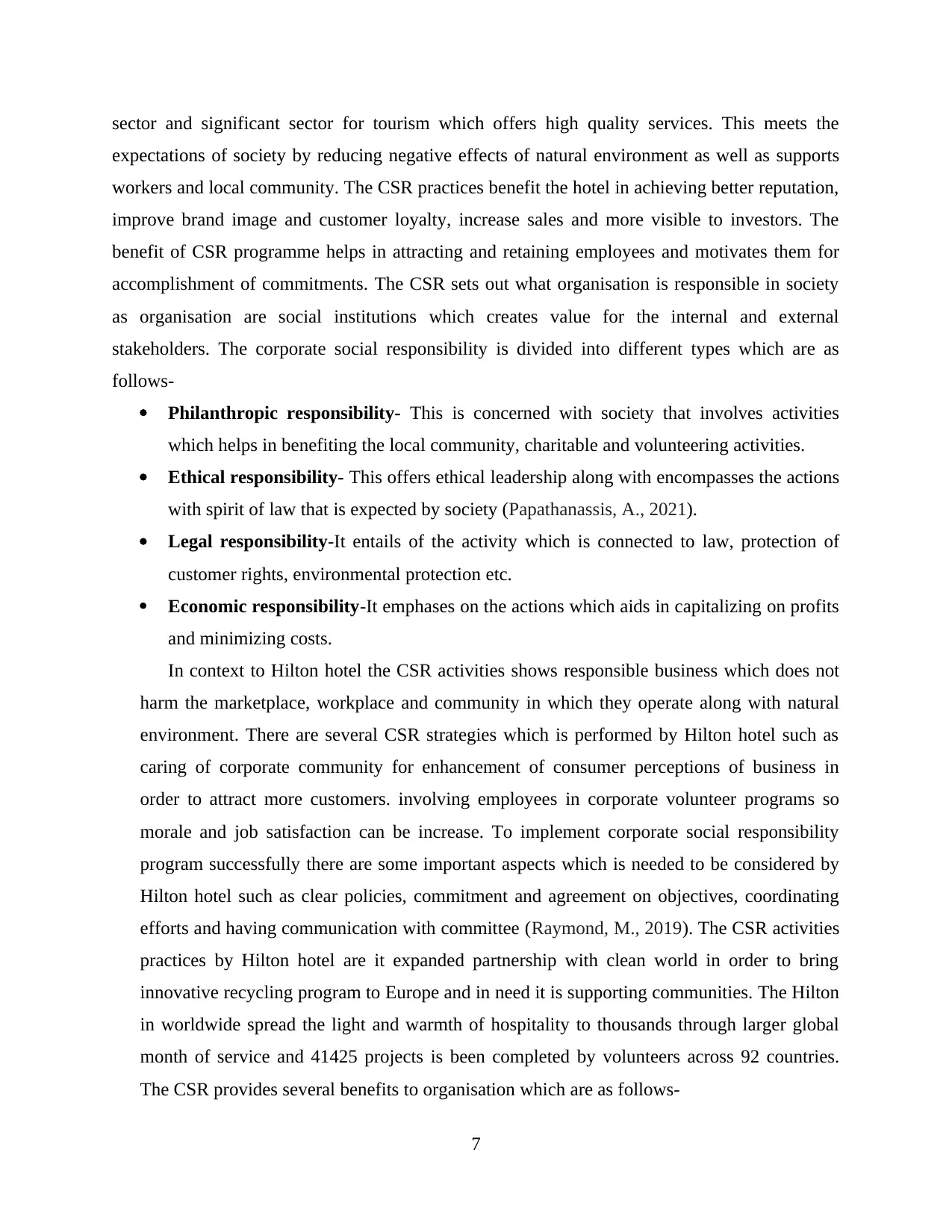
sector and significant sector for tourism which offers high quality services. This meets the
expectations of society by reducing negative effects of natural environment as well as supports
workers and local community. The CSR practices benefit the hotel in achieving better reputation,
improve brand image and customer loyalty, increase sales and more visible to investors. The
benefit of CSR programme helps in attracting and retaining employees and motivates them for
accomplishment of commitments. The CSR sets out what organisation is responsible in society
as organisation are social institutions which creates value for the internal and external
stakeholders. The corporate social responsibility is divided into different types which are as
follows-
Philanthropic responsibility- This is concerned with society that involves activities
which helps in benefiting the local community, charitable and volunteering activities.
Ethical responsibility- This offers ethical leadership along with encompasses the actions
with spirit of law that is expected by society (Papathanassis, A., 2021).
Legal responsibility-It entails of the activity which is connected to law, protection of
customer rights, environmental protection etc.
Economic responsibility-It emphases on the actions which aids in capitalizing on profits
and minimizing costs.
In context to Hilton hotel the CSR activities shows responsible business which does not
harm the marketplace, workplace and community in which they operate along with natural
environment. There are several CSR strategies which is performed by Hilton hotel such as
caring of corporate community for enhancement of consumer perceptions of business in
order to attract more customers. involving employees in corporate volunteer programs so
morale and job satisfaction can be increase. To implement corporate social responsibility
program successfully there are some important aspects which is needed to be considered by
Hilton hotel such as clear policies, commitment and agreement on objectives, coordinating
efforts and having communication with committee (Raymond, M., 2019). The CSR activities
practices by Hilton hotel are it expanded partnership with clean world in order to bring
innovative recycling program to Europe and in need it is supporting communities. The Hilton
in worldwide spread the light and warmth of hospitality to thousands through larger global
month of service and 41425 projects is been completed by volunteers across 92 countries.
The CSR provides several benefits to organisation which are as follows-
7
expectations of society by reducing negative effects of natural environment as well as supports
workers and local community. The CSR practices benefit the hotel in achieving better reputation,
improve brand image and customer loyalty, increase sales and more visible to investors. The
benefit of CSR programme helps in attracting and retaining employees and motivates them for
accomplishment of commitments. The CSR sets out what organisation is responsible in society
as organisation are social institutions which creates value for the internal and external
stakeholders. The corporate social responsibility is divided into different types which are as
follows-
Philanthropic responsibility- This is concerned with society that involves activities
which helps in benefiting the local community, charitable and volunteering activities.
Ethical responsibility- This offers ethical leadership along with encompasses the actions
with spirit of law that is expected by society (Papathanassis, A., 2021).
Legal responsibility-It entails of the activity which is connected to law, protection of
customer rights, environmental protection etc.
Economic responsibility-It emphases on the actions which aids in capitalizing on profits
and minimizing costs.
In context to Hilton hotel the CSR activities shows responsible business which does not
harm the marketplace, workplace and community in which they operate along with natural
environment. There are several CSR strategies which is performed by Hilton hotel such as
caring of corporate community for enhancement of consumer perceptions of business in
order to attract more customers. involving employees in corporate volunteer programs so
morale and job satisfaction can be increase. To implement corporate social responsibility
program successfully there are some important aspects which is needed to be considered by
Hilton hotel such as clear policies, commitment and agreement on objectives, coordinating
efforts and having communication with committee (Raymond, M., 2019). The CSR activities
practices by Hilton hotel are it expanded partnership with clean world in order to bring
innovative recycling program to Europe and in need it is supporting communities. The Hilton
in worldwide spread the light and warmth of hospitality to thousands through larger global
month of service and 41425 projects is been completed by volunteers across 92 countries.
The CSR provides several benefits to organisation which are as follows-
7
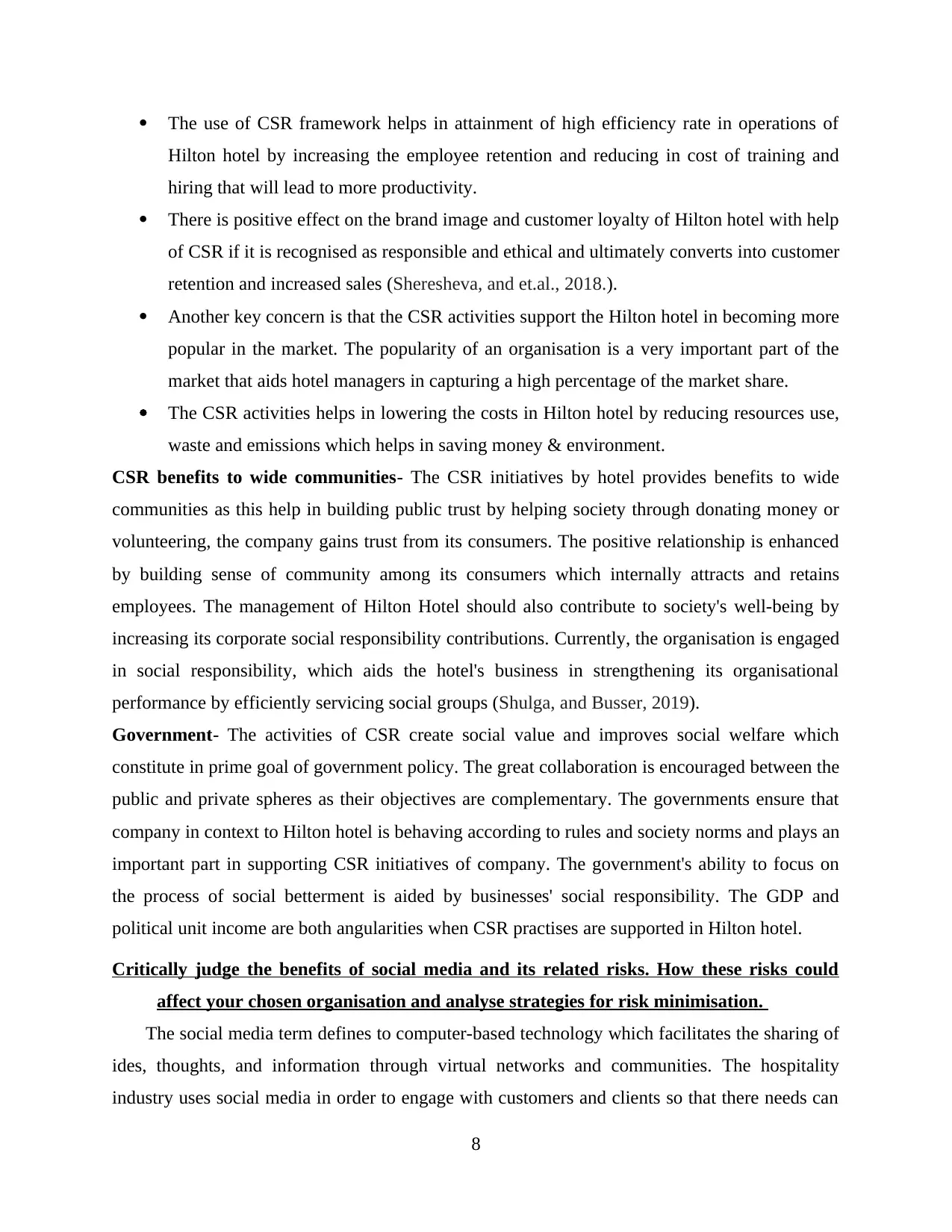
The use of CSR framework helps in attainment of high efficiency rate in operations of
Hilton hotel by increasing the employee retention and reducing in cost of training and
hiring that will lead to more productivity.
There is positive effect on the brand image and customer loyalty of Hilton hotel with help
of CSR if it is recognised as responsible and ethical and ultimately converts into customer
retention and increased sales (Sheresheva, and et.al., 2018.).
Another key concern is that the CSR activities support the Hilton hotel in becoming more
popular in the market. The popularity of an organisation is a very important part of the
market that aids hotel managers in capturing a high percentage of the market share.
The CSR activities helps in lowering the costs in Hilton hotel by reducing resources use,
waste and emissions which helps in saving money & environment.
CSR benefits to wide communities- The CSR initiatives by hotel provides benefits to wide
communities as this help in building public trust by helping society through donating money or
volunteering, the company gains trust from its consumers. The positive relationship is enhanced
by building sense of community among its consumers which internally attracts and retains
employees. The management of Hilton Hotel should also contribute to society's well-being by
increasing its corporate social responsibility contributions. Currently, the organisation is engaged
in social responsibility, which aids the hotel's business in strengthening its organisational
performance by efficiently servicing social groups (Shulga, and Busser, 2019).
Government- The activities of CSR create social value and improves social welfare which
constitute in prime goal of government policy. The great collaboration is encouraged between the
public and private spheres as their objectives are complementary. The governments ensure that
company in context to Hilton hotel is behaving according to rules and society norms and plays an
important part in supporting CSR initiatives of company. The government's ability to focus on
the process of social betterment is aided by businesses' social responsibility. The GDP and
political unit income are both angularities when CSR practises are supported in Hilton hotel.
Critically judge the benefits of social media and its related risks. How these risks could
affect your chosen organisation and analyse strategies for risk minimisation.
The social media term defines to computer-based technology which facilitates the sharing of
ides, thoughts, and information through virtual networks and communities. The hospitality
industry uses social media in order to engage with customers and clients so that there needs can
8
Hilton hotel by increasing the employee retention and reducing in cost of training and
hiring that will lead to more productivity.
There is positive effect on the brand image and customer loyalty of Hilton hotel with help
of CSR if it is recognised as responsible and ethical and ultimately converts into customer
retention and increased sales (Sheresheva, and et.al., 2018.).
Another key concern is that the CSR activities support the Hilton hotel in becoming more
popular in the market. The popularity of an organisation is a very important part of the
market that aids hotel managers in capturing a high percentage of the market share.
The CSR activities helps in lowering the costs in Hilton hotel by reducing resources use,
waste and emissions which helps in saving money & environment.
CSR benefits to wide communities- The CSR initiatives by hotel provides benefits to wide
communities as this help in building public trust by helping society through donating money or
volunteering, the company gains trust from its consumers. The positive relationship is enhanced
by building sense of community among its consumers which internally attracts and retains
employees. The management of Hilton Hotel should also contribute to society's well-being by
increasing its corporate social responsibility contributions. Currently, the organisation is engaged
in social responsibility, which aids the hotel's business in strengthening its organisational
performance by efficiently servicing social groups (Shulga, and Busser, 2019).
Government- The activities of CSR create social value and improves social welfare which
constitute in prime goal of government policy. The great collaboration is encouraged between the
public and private spheres as their objectives are complementary. The governments ensure that
company in context to Hilton hotel is behaving according to rules and society norms and plays an
important part in supporting CSR initiatives of company. The government's ability to focus on
the process of social betterment is aided by businesses' social responsibility. The GDP and
political unit income are both angularities when CSR practises are supported in Hilton hotel.
Critically judge the benefits of social media and its related risks. How these risks could
affect your chosen organisation and analyse strategies for risk minimisation.
The social media term defines to computer-based technology which facilitates the sharing of
ides, thoughts, and information through virtual networks and communities. The hospitality
industry uses social media in order to engage with customers and clients so that there needs can
8
Secure Best Marks with AI Grader
Need help grading? Try our AI Grader for instant feedback on your assignments.
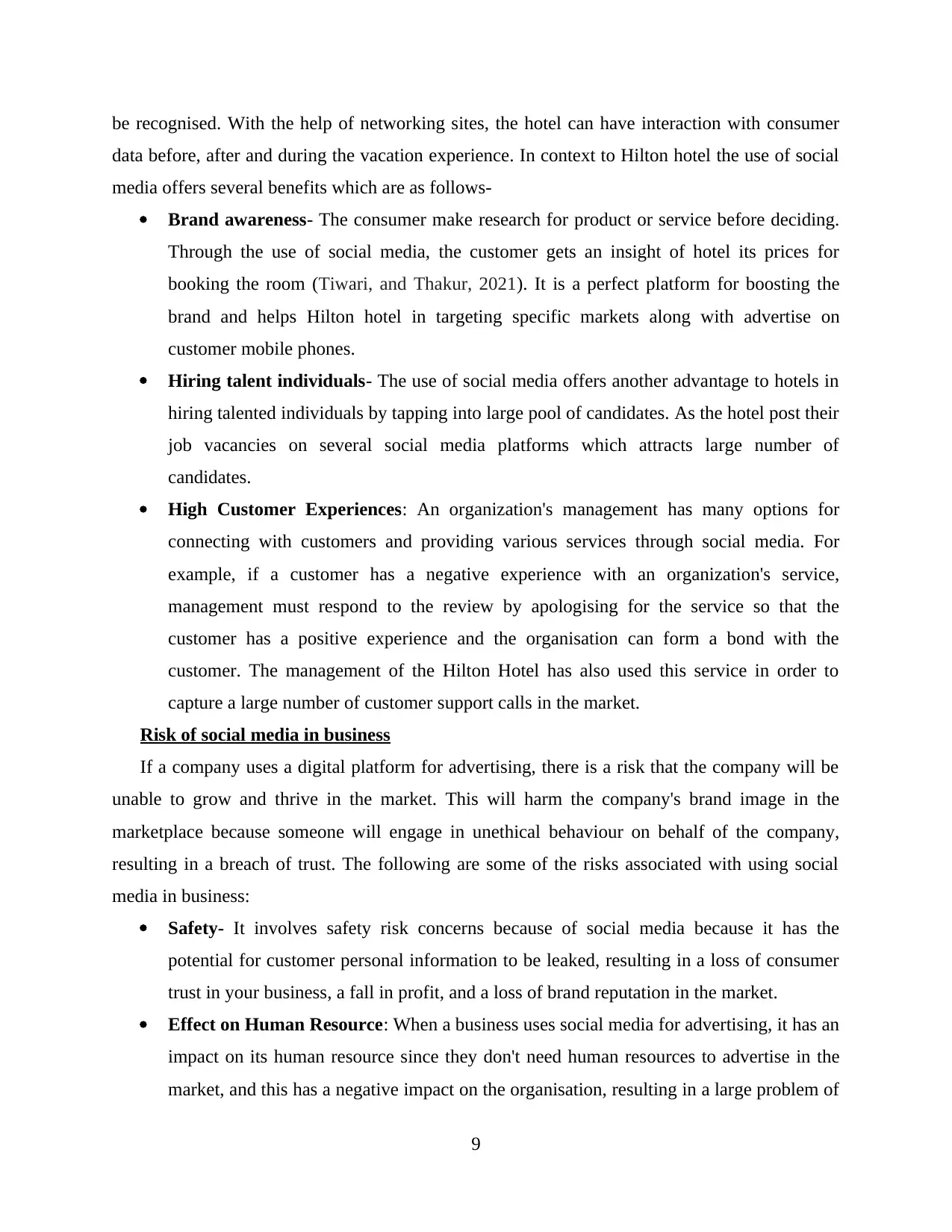
be recognised. With the help of networking sites, the hotel can have interaction with consumer
data before, after and during the vacation experience. In context to Hilton hotel the use of social
media offers several benefits which are as follows-
Brand awareness- The consumer make research for product or service before deciding.
Through the use of social media, the customer gets an insight of hotel its prices for
booking the room (Tiwari, and Thakur, 2021). It is a perfect platform for boosting the
brand and helps Hilton hotel in targeting specific markets along with advertise on
customer mobile phones.
Hiring talent individuals- The use of social media offers another advantage to hotels in
hiring talented individuals by tapping into large pool of candidates. As the hotel post their
job vacancies on several social media platforms which attracts large number of
candidates.
High Customer Experiences: An organization's management has many options for
connecting with customers and providing various services through social media. For
example, if a customer has a negative experience with an organization's service,
management must respond to the review by apologising for the service so that the
customer has a positive experience and the organisation can form a bond with the
customer. The management of the Hilton Hotel has also used this service in order to
capture a large number of customer support calls in the market.
Risk of social media in business
If a company uses a digital platform for advertising, there is a risk that the company will be
unable to grow and thrive in the market. This will harm the company's brand image in the
marketplace because someone will engage in unethical behaviour on behalf of the company,
resulting in a breach of trust. The following are some of the risks associated with using social
media in business:
Safety- It involves safety risk concerns because of social media because it has the
potential for customer personal information to be leaked, resulting in a loss of consumer
trust in your business, a fall in profit, and a loss of brand reputation in the market.
Effect on Human Resource: When a business uses social media for advertising, it has an
impact on its human resource since they don't need human resources to advertise in the
market, and this has a negative impact on the organisation, resulting in a large problem of
9
data before, after and during the vacation experience. In context to Hilton hotel the use of social
media offers several benefits which are as follows-
Brand awareness- The consumer make research for product or service before deciding.
Through the use of social media, the customer gets an insight of hotel its prices for
booking the room (Tiwari, and Thakur, 2021). It is a perfect platform for boosting the
brand and helps Hilton hotel in targeting specific markets along with advertise on
customer mobile phones.
Hiring talent individuals- The use of social media offers another advantage to hotels in
hiring talented individuals by tapping into large pool of candidates. As the hotel post their
job vacancies on several social media platforms which attracts large number of
candidates.
High Customer Experiences: An organization's management has many options for
connecting with customers and providing various services through social media. For
example, if a customer has a negative experience with an organization's service,
management must respond to the review by apologising for the service so that the
customer has a positive experience and the organisation can form a bond with the
customer. The management of the Hilton Hotel has also used this service in order to
capture a large number of customer support calls in the market.
Risk of social media in business
If a company uses a digital platform for advertising, there is a risk that the company will be
unable to grow and thrive in the market. This will harm the company's brand image in the
marketplace because someone will engage in unethical behaviour on behalf of the company,
resulting in a breach of trust. The following are some of the risks associated with using social
media in business:
Safety- It involves safety risk concerns because of social media because it has the
potential for customer personal information to be leaked, resulting in a loss of consumer
trust in your business, a fall in profit, and a loss of brand reputation in the market.
Effect on Human Resource: When a business uses social media for advertising, it has an
impact on its human resource since they don't need human resources to advertise in the
market, and this has a negative impact on the organisation, resulting in a large problem of
9
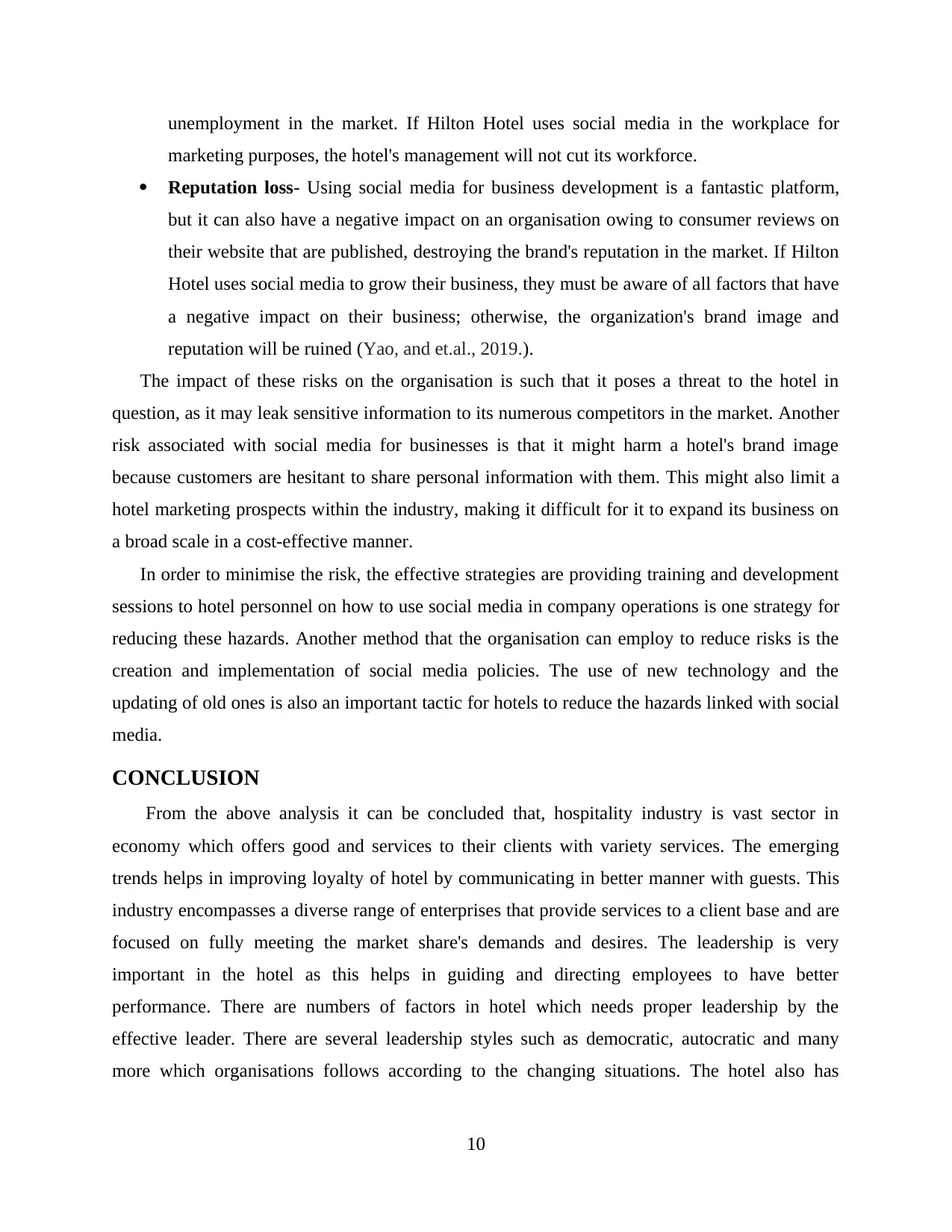
unemployment in the market. If Hilton Hotel uses social media in the workplace for
marketing purposes, the hotel's management will not cut its workforce.
Reputation loss- Using social media for business development is a fantastic platform,
but it can also have a negative impact on an organisation owing to consumer reviews on
their website that are published, destroying the brand's reputation in the market. If Hilton
Hotel uses social media to grow their business, they must be aware of all factors that have
a negative impact on their business; otherwise, the organization's brand image and
reputation will be ruined (Yao, and et.al., 2019.).
The impact of these risks on the organisation is such that it poses a threat to the hotel in
question, as it may leak sensitive information to its numerous competitors in the market. Another
risk associated with social media for businesses is that it might harm a hotel's brand image
because customers are hesitant to share personal information with them. This might also limit a
hotel marketing prospects within the industry, making it difficult for it to expand its business on
a broad scale in a cost-effective manner.
In order to minimise the risk, the effective strategies are providing training and development
sessions to hotel personnel on how to use social media in company operations is one strategy for
reducing these hazards. Another method that the organisation can employ to reduce risks is the
creation and implementation of social media policies. The use of new technology and the
updating of old ones is also an important tactic for hotels to reduce the hazards linked with social
media.
CONCLUSION
From the above analysis it can be concluded that, hospitality industry is vast sector in
economy which offers good and services to their clients with variety services. The emerging
trends helps in improving loyalty of hotel by communicating in better manner with guests. This
industry encompasses a diverse range of enterprises that provide services to a client base and are
focused on fully meeting the market share's demands and desires. The leadership is very
important in the hotel as this helps in guiding and directing employees to have better
performance. There are numbers of factors in hotel which needs proper leadership by the
effective leader. There are several leadership styles such as democratic, autocratic and many
more which organisations follows according to the changing situations. The hotel also has
10
marketing purposes, the hotel's management will not cut its workforce.
Reputation loss- Using social media for business development is a fantastic platform,
but it can also have a negative impact on an organisation owing to consumer reviews on
their website that are published, destroying the brand's reputation in the market. If Hilton
Hotel uses social media to grow their business, they must be aware of all factors that have
a negative impact on their business; otherwise, the organization's brand image and
reputation will be ruined (Yao, and et.al., 2019.).
The impact of these risks on the organisation is such that it poses a threat to the hotel in
question, as it may leak sensitive information to its numerous competitors in the market. Another
risk associated with social media for businesses is that it might harm a hotel's brand image
because customers are hesitant to share personal information with them. This might also limit a
hotel marketing prospects within the industry, making it difficult for it to expand its business on
a broad scale in a cost-effective manner.
In order to minimise the risk, the effective strategies are providing training and development
sessions to hotel personnel on how to use social media in company operations is one strategy for
reducing these hazards. Another method that the organisation can employ to reduce risks is the
creation and implementation of social media policies. The use of new technology and the
updating of old ones is also an important tactic for hotels to reduce the hazards linked with social
media.
CONCLUSION
From the above analysis it can be concluded that, hospitality industry is vast sector in
economy which offers good and services to their clients with variety services. The emerging
trends helps in improving loyalty of hotel by communicating in better manner with guests. This
industry encompasses a diverse range of enterprises that provide services to a client base and are
focused on fully meeting the market share's demands and desires. The leadership is very
important in the hotel as this helps in guiding and directing employees to have better
performance. There are numbers of factors in hotel which needs proper leadership by the
effective leader. There are several leadership styles such as democratic, autocratic and many
more which organisations follows according to the changing situations. The hotel also has
10
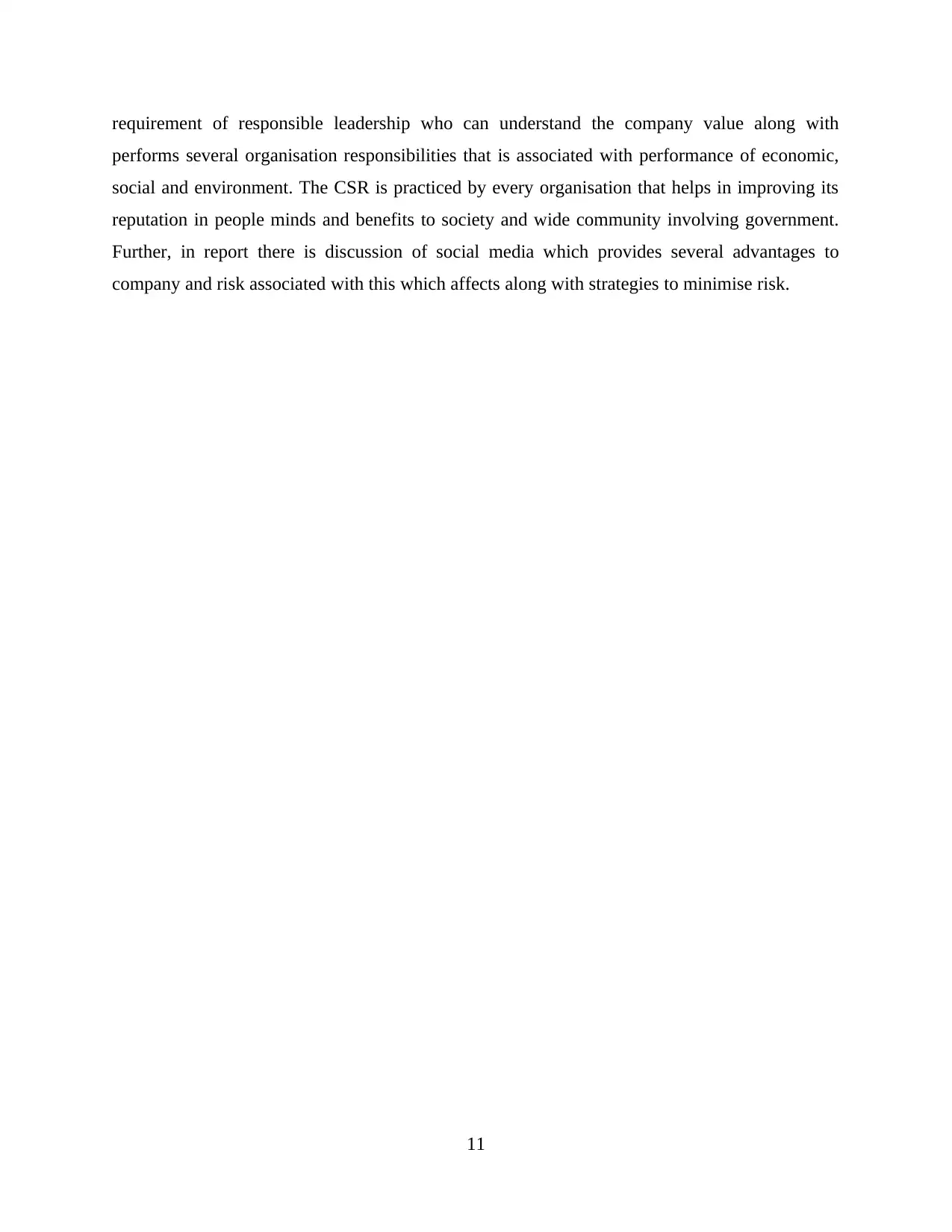
requirement of responsible leadership who can understand the company value along with
performs several organisation responsibilities that is associated with performance of economic,
social and environment. The CSR is practiced by every organisation that helps in improving its
reputation in people minds and benefits to society and wide community involving government.
Further, in report there is discussion of social media which provides several advantages to
company and risk associated with this which affects along with strategies to minimise risk.
11
performs several organisation responsibilities that is associated with performance of economic,
social and environment. The CSR is practiced by every organisation that helps in improving its
reputation in people minds and benefits to society and wide community involving government.
Further, in report there is discussion of social media which provides several advantages to
company and risk associated with this which affects along with strategies to minimise risk.
11
Paraphrase This Document
Need a fresh take? Get an instant paraphrase of this document with our AI Paraphraser
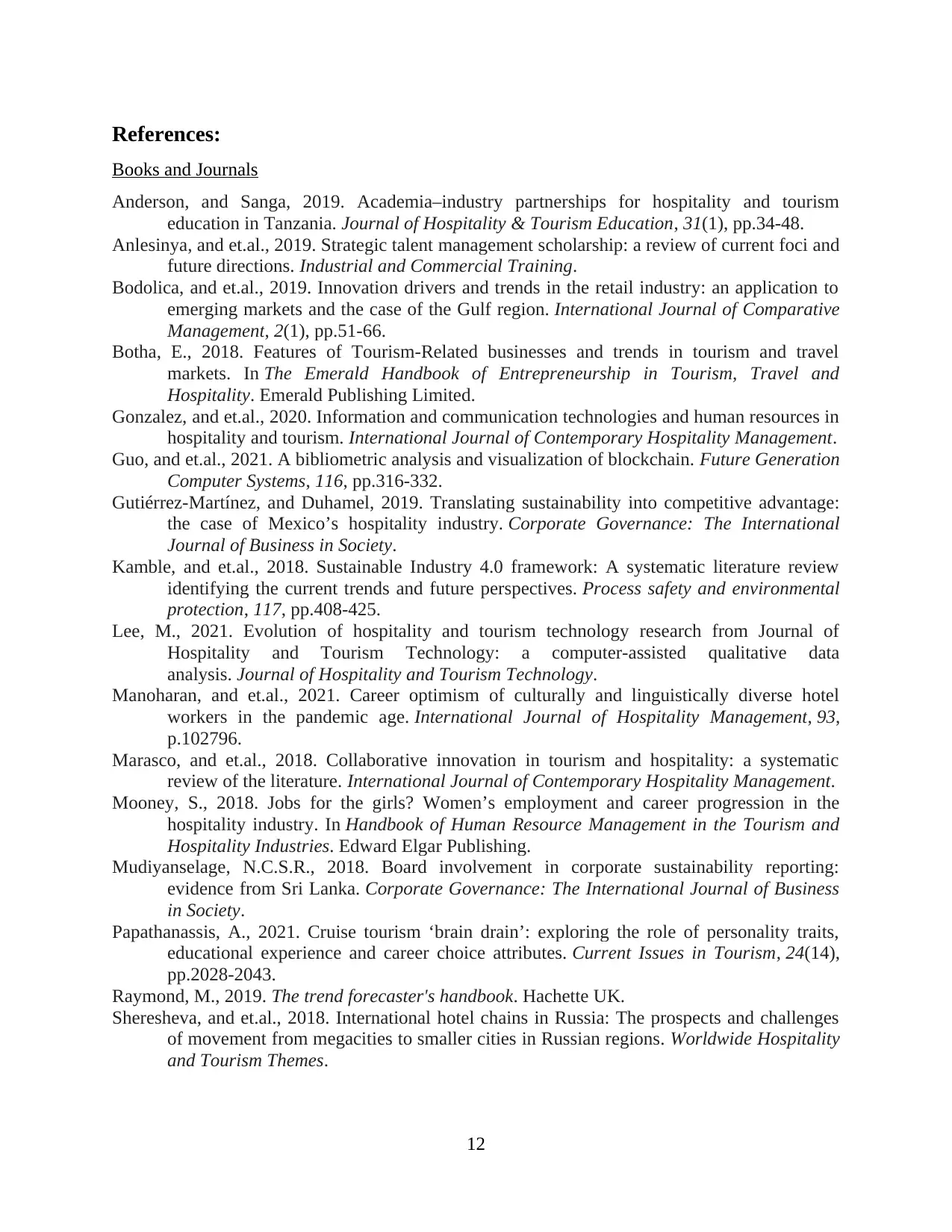
References:
Books and Journals
Anderson, and Sanga, 2019. Academia–industry partnerships for hospitality and tourism
education in Tanzania. Journal of Hospitality & Tourism Education, 31(1), pp.34-48.
Anlesinya, and et.al., 2019. Strategic talent management scholarship: a review of current foci and
future directions. Industrial and Commercial Training.
Bodolica, and et.al., 2019. Innovation drivers and trends in the retail industry: an application to
emerging markets and the case of the Gulf region. International Journal of Comparative
Management, 2(1), pp.51-66.
Botha, E., 2018. Features of Tourism-Related businesses and trends in tourism and travel
markets. In The Emerald Handbook of Entrepreneurship in Tourism, Travel and
Hospitality. Emerald Publishing Limited.
Gonzalez, and et.al., 2020. Information and communication technologies and human resources in
hospitality and tourism. International Journal of Contemporary Hospitality Management.
Guo, and et.al., 2021. A bibliometric analysis and visualization of blockchain. Future Generation
Computer Systems, 116, pp.316-332.
Gutiérrez-Martínez, and Duhamel, 2019. Translating sustainability into competitive advantage:
the case of Mexico’s hospitality industry. Corporate Governance: The International
Journal of Business in Society.
Kamble, and et.al., 2018. Sustainable Industry 4.0 framework: A systematic literature review
identifying the current trends and future perspectives. Process safety and environmental
protection, 117, pp.408-425.
Lee, M., 2021. Evolution of hospitality and tourism technology research from Journal of
Hospitality and Tourism Technology: a computer-assisted qualitative data
analysis. Journal of Hospitality and Tourism Technology.
Manoharan, and et.al., 2021. Career optimism of culturally and linguistically diverse hotel
workers in the pandemic age. International Journal of Hospitality Management, 93,
p.102796.
Marasco, and et.al., 2018. Collaborative innovation in tourism and hospitality: a systematic
review of the literature. International Journal of Contemporary Hospitality Management.
Mooney, S., 2018. Jobs for the girls? Women’s employment and career progression in the
hospitality industry. In Handbook of Human Resource Management in the Tourism and
Hospitality Industries. Edward Elgar Publishing.
Mudiyanselage, N.C.S.R., 2018. Board involvement in corporate sustainability reporting:
evidence from Sri Lanka. Corporate Governance: The International Journal of Business
in Society.
Papathanassis, A., 2021. Cruise tourism ‘brain drain’: exploring the role of personality traits,
educational experience and career choice attributes. Current Issues in Tourism, 24(14),
pp.2028-2043.
Raymond, M., 2019. The trend forecaster's handbook. Hachette UK.
Sheresheva, and et.al., 2018. International hotel chains in Russia: The prospects and challenges
of movement from megacities to smaller cities in Russian regions. Worldwide Hospitality
and Tourism Themes.
12
Books and Journals
Anderson, and Sanga, 2019. Academia–industry partnerships for hospitality and tourism
education in Tanzania. Journal of Hospitality & Tourism Education, 31(1), pp.34-48.
Anlesinya, and et.al., 2019. Strategic talent management scholarship: a review of current foci and
future directions. Industrial and Commercial Training.
Bodolica, and et.al., 2019. Innovation drivers and trends in the retail industry: an application to
emerging markets and the case of the Gulf region. International Journal of Comparative
Management, 2(1), pp.51-66.
Botha, E., 2018. Features of Tourism-Related businesses and trends in tourism and travel
markets. In The Emerald Handbook of Entrepreneurship in Tourism, Travel and
Hospitality. Emerald Publishing Limited.
Gonzalez, and et.al., 2020. Information and communication technologies and human resources in
hospitality and tourism. International Journal of Contemporary Hospitality Management.
Guo, and et.al., 2021. A bibliometric analysis and visualization of blockchain. Future Generation
Computer Systems, 116, pp.316-332.
Gutiérrez-Martínez, and Duhamel, 2019. Translating sustainability into competitive advantage:
the case of Mexico’s hospitality industry. Corporate Governance: The International
Journal of Business in Society.
Kamble, and et.al., 2018. Sustainable Industry 4.0 framework: A systematic literature review
identifying the current trends and future perspectives. Process safety and environmental
protection, 117, pp.408-425.
Lee, M., 2021. Evolution of hospitality and tourism technology research from Journal of
Hospitality and Tourism Technology: a computer-assisted qualitative data
analysis. Journal of Hospitality and Tourism Technology.
Manoharan, and et.al., 2021. Career optimism of culturally and linguistically diverse hotel
workers in the pandemic age. International Journal of Hospitality Management, 93,
p.102796.
Marasco, and et.al., 2018. Collaborative innovation in tourism and hospitality: a systematic
review of the literature. International Journal of Contemporary Hospitality Management.
Mooney, S., 2018. Jobs for the girls? Women’s employment and career progression in the
hospitality industry. In Handbook of Human Resource Management in the Tourism and
Hospitality Industries. Edward Elgar Publishing.
Mudiyanselage, N.C.S.R., 2018. Board involvement in corporate sustainability reporting:
evidence from Sri Lanka. Corporate Governance: The International Journal of Business
in Society.
Papathanassis, A., 2021. Cruise tourism ‘brain drain’: exploring the role of personality traits,
educational experience and career choice attributes. Current Issues in Tourism, 24(14),
pp.2028-2043.
Raymond, M., 2019. The trend forecaster's handbook. Hachette UK.
Sheresheva, and et.al., 2018. International hotel chains in Russia: The prospects and challenges
of movement from megacities to smaller cities in Russian regions. Worldwide Hospitality
and Tourism Themes.
12
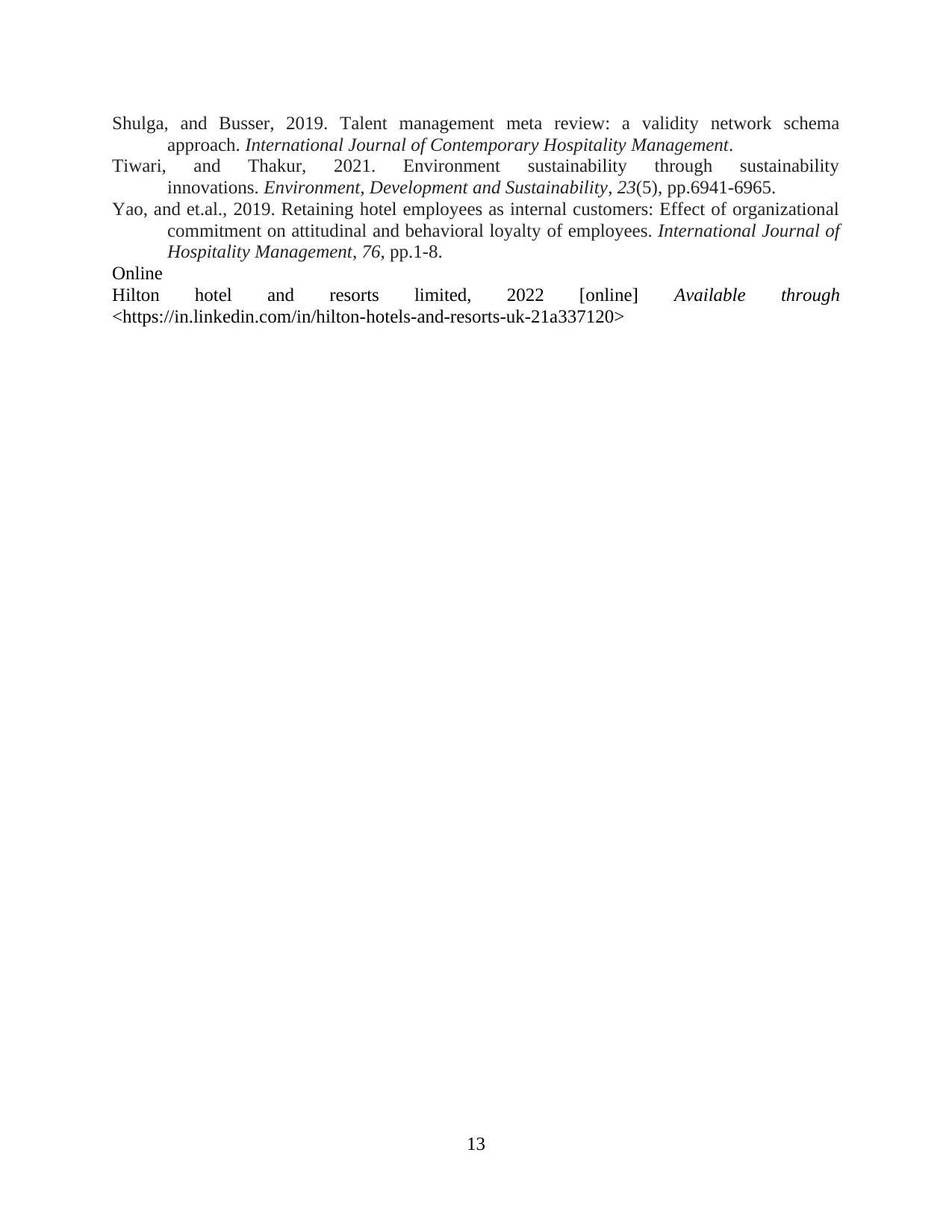
Shulga, and Busser, 2019. Talent management meta review: a validity network schema
approach. International Journal of Contemporary Hospitality Management.
Tiwari, and Thakur, 2021. Environment sustainability through sustainability
innovations. Environment, Development and Sustainability, 23(5), pp.6941-6965.
Yao, and et.al., 2019. Retaining hotel employees as internal customers: Effect of organizational
commitment on attitudinal and behavioral loyalty of employees. International Journal of
Hospitality Management, 76, pp.1-8.
Online
Hilton hotel and resorts limited, 2022 [online] Available through
<https://in.linkedin.com/in/hilton-hotels-and-resorts-uk-21a337120>
13
approach. International Journal of Contemporary Hospitality Management.
Tiwari, and Thakur, 2021. Environment sustainability through sustainability
innovations. Environment, Development and Sustainability, 23(5), pp.6941-6965.
Yao, and et.al., 2019. Retaining hotel employees as internal customers: Effect of organizational
commitment on attitudinal and behavioral loyalty of employees. International Journal of
Hospitality Management, 76, pp.1-8.
Online
Hilton hotel and resorts limited, 2022 [online] Available through
<https://in.linkedin.com/in/hilton-hotels-and-resorts-uk-21a337120>
13
1 out of 15
Your All-in-One AI-Powered Toolkit for Academic Success.
+13062052269
info@desklib.com
Available 24*7 on WhatsApp / Email
![[object Object]](/_next/static/media/star-bottom.7253800d.svg)
Unlock your academic potential
© 2024 | Zucol Services PVT LTD | All rights reserved.